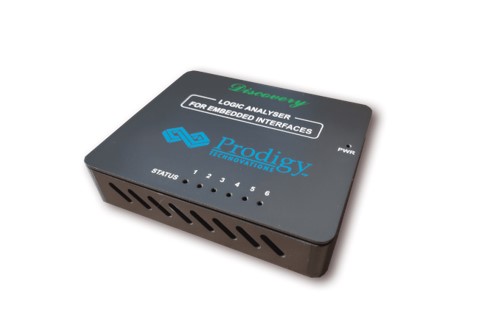
HOW TO SELECT THE RIGHT PROBES FOR DEBUGGING?
Debugging design in embedded systems is quite complex and Logic analyzers play a very important role to expedite the debugging and development cycle. Logic analyzers have a large number of channels that allow engineers to acquire many signals by connecting to a variety of test points on the DUT. Connections from the DUT to the logic analyzer are done using probes.
A logic analyzer measurement is only as accurate and reliable as the probe of the logic analyzer. Selecting the right kind of probe is critical to the success of measurement and debugging of the DUT. The probe has an internal comparator in which input voltage is compared against the threshold voltage (Vth). The threshold value is user-defined, ranging from TTL levels to CMOS and ECL.
Hence selecting the right kind of probe allows for better design debugging. There are many kinds types of probes out in the market used to debug the design under test, the most commonly used being flying lead probes, multi-channel probes, and compression-type probes as shown below:
FLYING LEAD PROBES
Flying lead probes are general-purpose probes meant for point-to-point troubleshooting. Flying lead probes allow engineers to connect to a variety of wires, pins, and test points on the DUT and can be used for debugging in most applications such as IoT and low-speed interfaces in semiconductor chips.
Figure 1. Flying lead probes
HIGH-DENSITY MULTI-CHANNEL PROBES
High-density multi-channel probes require a dedicated connector on the DUT like a Mictor connector. High-density multi-channel probes are capable of acquiring high-quality signals with minimal impact on the DUT. High-density multi-channel probes are used in applications like JTAG for FPGA debugging. Along with JTAG, Mictor connectors are also used to debug trace signals like ARM CoreSight ETM.
Figure 2. High-density multi-channel probes
COMPRESSION PROBES
Compression probes use a connectorless probe attachment and are recommended for applications that require high signal density. The connectorless probe attachment allows for quick and reliable connections to the DUT. Compression-type probes are used for applications like JTAG for FPGA debugging and are also used to debug hardware trace signals like ARM CoreSight ETM.
Figure 3. Compression type probes
WHAT IS PROBE LOADING?
The impedance of the probes (capacitance, resistance, and inductance) plays an important role in the overall load on the DUT. All probes exhibit some loading characteristics.
The Discovery series Logic Analyzer comes with a set of general-purpose flying lead probes for point-to-point troubleshooting which allows the user to maintain high signal integrity and capture timing errors, analyze setup and hold time issues, glitches, and view synchronous data activities.
Figure 4. Logic analyzer for embedded interfaces.
ABOUT AUTHOR
Raghavendra Bhat is an Application Engineer at Prodigy Technovations. He graduated from NMAM Institute of Technology in 2020 with a bachelor’s degree in Electronics & Communication Engineering. His area of interest includes Embedded systems, Digital System Design, and Automotive Electronics.
For more information reach out to us at (contact@prodigytechno.com)







